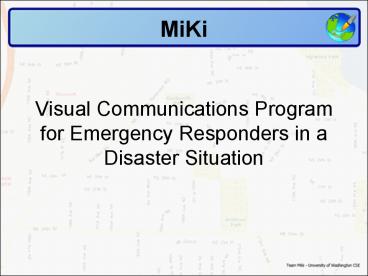MiKi PowerPoint PPT Presentation
Title: MiKi
1
MiKi
- Visual Communications Program for Emergency
Responders in a Disaster Situation
2
Outline
- Introduction and Motivation
- MiKi
- Introduction Demo
- Interactive Demo
- Development
- Future Plans
- Q A
Outline Intro Miki Demo 1 Demo 2 Dev. Future Q
A Appendix
3
Disaster Recovery
- Disasters typically compromise the two things
most essential for response and relief services -
the ability to communicate and the ability to
function in a geographically disrupted area.
Whether the agency is a first responder or a
social service provider whether the information
is damage assessment or site assignment -
solutions to these problems are vital. - Barb Graff
- Director of Emergency Management
- Seattle Police Department
Outline Intro Miki Demo 1 Demo 2 Dev. Future Q
A Appendix
4
Tablets with Maps
- Panning and Zooming Map
- Pen-Based Interface
- Expressive
- Natural to use
- Portability
- Wireless Networking
- Clients can share ink through a database
Outline Intro Miki Demo 1 Demo 2 Dev. Future Q
A Appendix
5
MiKi Application
- MiKi Maps Wiki
- Pen Input Enabled
- For Emergency Responders
- Share information by drawing on maps
- Built on WinFX for Vista
- WPF Ink (Avalon)
Outline Intro Miki Demo 1 Demo 2 Dev. Future Q
A Appendix
6
DEMO
Outline Intro Miki Demo 1 Demo 2 Dev. Future Q
A Appendix
7
Development
- Platforms
- Virtual Earth
- Tablet PC
- WinFX
- WPF / XAML
- .NET Web Services
- SQL Server 2005
- Tools
- VS Team System
- Team Foundation
- Architecture
Outline Intro Miki Demo 1 Demo 2 Dev. Future Q
A Appendix
8
Future Plans
- Permission levels for different groups and
organizations - Route finding
- GPS
Outline Intro Miki Demo 1 Demo 2 Dev. Future Q
A Appendix
9
Q A
- Acknowledgements
- Steve Lombardi, Virtual Earth PM
- Barb Graff, Dir of Emergency Mgmt
- Vicky Storm, UW Chief of Police
- Firefighters of Fire Station 17
- Richard Anderson, UW CSE
- Valentin Razmov, UW CSE
Outline Intro Miki Demo 1 Demo 2 Dev. Future Q
A Appendix
10
Appendix
- Fire engines and trucks from each fire station
will go out on damage-assessment routes, where
they will look for dangerous situations and
buildings, and look for trapped victims, fires,
major damage to utilities, building damage and
bridge conditions. - Seattle Mayor Greg Nickels
- Emergency Preparedness web site
- http//www.ci.seattle.wa.us/mayor/issues/emergency
Prep - May 4, 2006
Outline Intro Miki Demo 1 Demo 2 Dev. Future Q
A Appendix
11
Appendix
- Commanders are still using Grease pencils on
glass to represent Emergency Responders visually
in the command Center, because they are
comfortable with that interface, and not with a
Computer Interface. - Fire Station 17
- Seattle
Outline Intro Miki Demo 1 Demo 2 Dev. Future Q
A Appendix
12
Appendix
- The MiKi is a great system to allow emergency
responders to not only see, in real time, scene
management, but to document what is going on and
to have a record of the response and activity
during a major event. The incident commander,
supervisors, other critical on scene responders
and managers can easily see what is happening,
where responders are located, what needs to be
covered or addressed, and know what others are
doing because of its interactive capability.
This is a terrific tool that enhances critical
incident response and management. - Vicky Storm
- Chief of Police
- University of Washington
Outline Intro Miki Demo 1 Demo 2 Dev. Future Q
A Appendix
13
Appendix
Outline Intro Miki Demo 1 Demo 2 Dev. Future Q
A Appendix

